Top Rankings
Cedar Falls Comm School District ranks among the top 20% of public school district in Iowa for:
Category
Attribute
Overall Rank
Highest overall rank (Top 20%)
Math Proficiency
Highest math proficiency (Top 20%)
Reading/Language Arts Proficiency
Highest reading/language arts proficiency (Top 10%)
Science Proficiency
Highest science proficiency (Top 20%)
Graduation Rate
Highest graduation rate (Top 20%)
Community Size
Largest student body (number of students) (Top 1%)
For the 2025 school year, there are 7 public preschools serving 3,231 students in Cedar Falls Comm School District. This district's average pre testing ranking is 7/10, which is in the top 50% of public pre schools in Iowa.
Public Preschools in Cedar Falls Comm School District have an average math proficiency score of 75% (versus the Iowa public pre school average of 70%), and reading proficiency score of 82% (versus the 69% statewide average).
Minority enrollment is 19% of the student body (majority Black and Asian), which is less than the Iowa public preschool average of 27% (majority Hispanic).
Overview
This School District
This State (IA)
# Schools
10 Schools
474 Schools
# Students
5,886 Students
151,894 Students
# Teachers
415 Teachers
11,053 Teachers
Student : Teacher Ratio
14:1
14:1
District Rank
Cedar Falls Comm School District, which is ranked within the top 20% of all 325 school districts in Iowa (based off of combined math and reading proficiency testing data) for the 2021-2022 school year.
The school district's graduation rate of 95% has decreased from 96% over five school years.
Overall District Rank
#35 out of 327 school districts
(Top 20%)
(Top 20%)
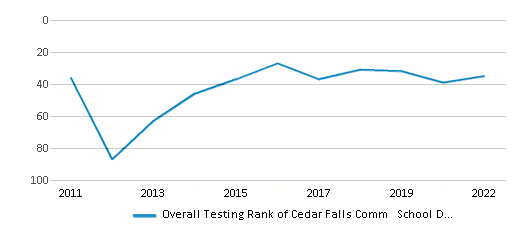
Math Test Scores (% Proficient)
77%
64%
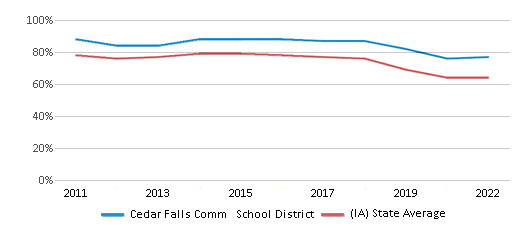
Reading/Language Arts Test Scores (% Proficient)
82%
70%
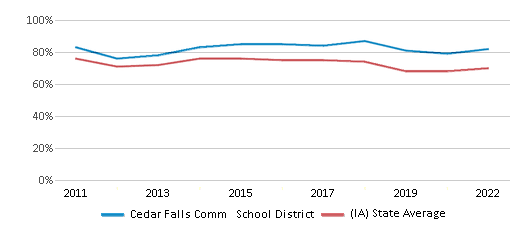
Science Test Scores (% Proficient)
75%
63%
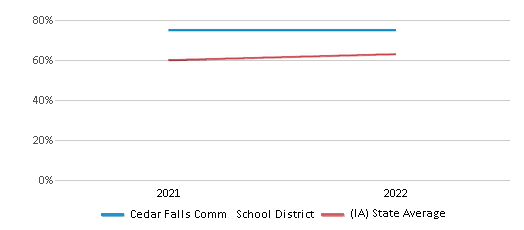
Graduation Rate
95%
90%
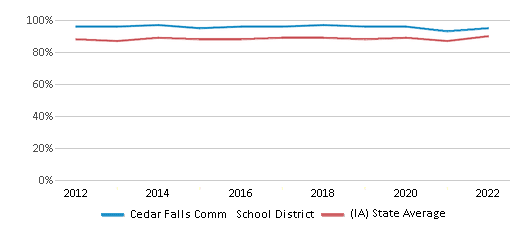
Students by Ethnicity:
Diversity Score
0.32
0.45
# American Indian Students
7 Students
532 Students
% American Indian Students
n/a
n/a
# Asian Students
192 Students
2,925 Students
% Asian Students
3%
2%
# Hispanic Students
183 Students
18,818 Students
% Hispanic Students
3%
13%
# Black Students
239 Students
9,688 Students
% Black Students
4%
6%
# White Students
4,851 Students
111,231 Students
% White Students
83%
73%
# Hawaiian Students
40 Students
1,189 Students
% Hawaiian Students
1%
1%
# Two or more races Students
374 Students
7,501 Students
% of Two or more races Students
6%
5%
Students by Grade:
# Students in PK Grade:
198
23,036
# Students in K Grade:
460
25,738
# Students in 1st Grade:
403
22,613
# Students in 2nd Grade:
416
21,812
# Students in 3rd Grade:
439
20,001
# Students in 4th Grade:
423
18,600
# Students in 5th Grade:
450
14,277
# Students in 6th Grade:
442
5,389
# Students in 7th Grade:
438
67
# Students in 8th Grade:
439
108
# Students in 9th Grade:
442
31
# Students in 10th Grade:
434
54
# Students in 11th Grade:
470
71
# Students in 12th Grade:
432
97
# Ungraded Students:
-
-
District Revenue and Spending
The revenue/student of $13,766 in this school district is less than the state median of $16,468. The school district revenue/student has stayed relatively flat over four school years.
The school district's spending/student of $13,057 is less than the state median of $16,042. The school district spending/student has stayed relatively flat over four school years.
Total Revenue
$81 MM
$8,262 MM
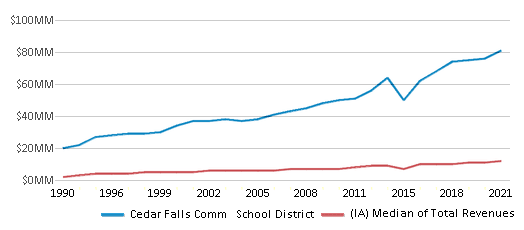
Spending
$77 MM
$8,048 MM
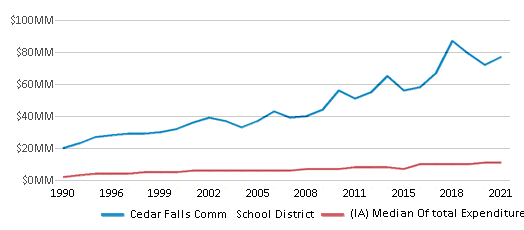
Revenue / Student
$13,766
$16,468
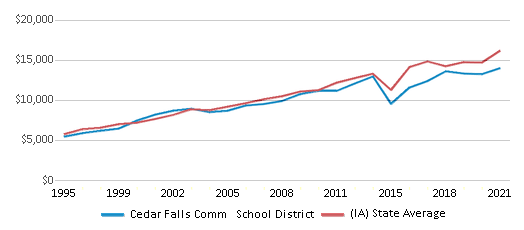
Spending / Student
$13,057
$16,042
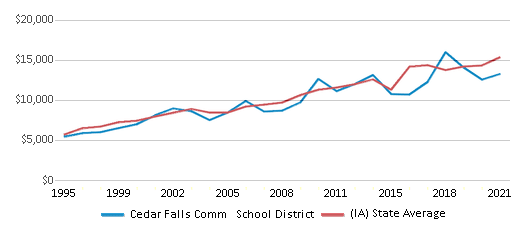
Best Cedar Falls Comm School District Public Preschools (2025)
School
(Math and Reading Proficiency)
(Math and Reading Proficiency)
Location
Grades
Students
Rank: #11.
Bess Streeter Aldrich Elementary School
(Math: 86% | Reading: 92%)
Rank:
Rank:
10/
Top 5%10
2526 Ashworth Drive
Cedar Falls, IA 50613
(319) 553-2901
Cedar Falls, IA 50613
(319) 553-2901
Grades: PK-6
| 475 students
Rank: #22.
Helen A Hansen Elementary School
(Math: 82% | Reading: 88%)
Rank:
Rank:
10/
Top 10%10
616 Holmes Dr
Cedar Falls, IA 50613
(319) 553-2775
Cedar Falls, IA 50613
(319) 553-2775
Grades: PK-6
| 565 students
Rank: #33.
Southdale Elementary School
(Math: 79% | Reading: 90%)
Rank:
Rank:
10/
Top 10%10
627 Orchard Dr
Cedar Falls, IA 50613
(319) 553-2900
Cedar Falls, IA 50613
(319) 553-2900
Grades: PK-6
| 562 students
Rank: #44.
North Cedar Elementary School
(Math: 65-69% | Reading: 75-79%)
Rank:
Rank:
7/
Top 50%10
2419 Fern Ave
Cedar Falls, IA 50613
(319) 553-2810
Cedar Falls, IA 50613
(319) 553-2810
Grades: PK-6
| 297 students
Rank: #55.
Orchard Hill Elementary School
(Math: 72% | Reading: 74%)
Rank:
Rank:
7/
Top 50%10
3909 Rownd St
Cedar Falls, IA 50613
(319) 553-2465
Cedar Falls, IA 50613
(319) 553-2465
Grades: PK-6
| 452 students
Rank: #66.
Cedar Heights Elementary School
(Math: 67% | Reading: 75%)
Rank:
Rank:
6/
Top 50%10
2417 Rainbow Dr
Cedar Falls, IA 50613
(319) 553-2855
Cedar Falls, IA 50613
(319) 553-2855
Grades: PK-6
| 432 students
Rank: #77.
Lincoln Elementary School
(Math: 65% | Reading: 74%)
Rank:
Rank:
5/
Bottom 50%10
321 8th Street
Cedar Falls, IA 50613
(319) 553-2950
Cedar Falls, IA 50613
(319) 553-2950
Grades: PK-6
| 448 students
Recent Articles

Year-Round Or Traditional Schedule?
Which is more appropriate for your child? A year-round attendance schedule or traditional schedule? We look at the pros and cons.

Why You Should Encourage Your Child to Join a Sports Team
Participating in team sports has a great many benefits for children, there is no doubt. In this article you will learn what those benefits are.

White Students are Now the Minority in U.S. Public Schools
Increasing birth rates among immigrant families from Asia and Central and South America, combined with lower birth rates among white families, means that for the first time in history, public school students in the United States are majority-minority. This shift in demographics poses difficulties for schools as they work to accommodate children of varying language abilities and socio-economic backgrounds.





